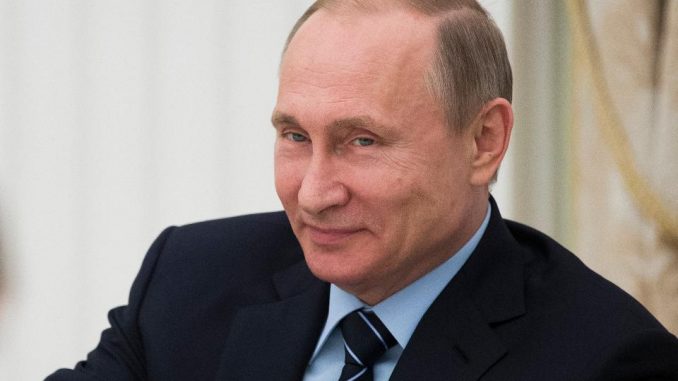
While the rest of us are distracted while we firm up our Christmas plans and finishup the last minute shopping that we are all prone to do, the United States Senate has been busy on another front; taking measures that could well lead to a hot war with Russia given the recent international incident between Russia and Ukraine in the Kerch Strait.
Senator Ron Johnson (R- Wis) and Richard Durban (D-Ill) and 39 of their colleagues introduced a Senate Resolution on December 19, 2019 which calls for “a prompt multinational freedom of navigation operation in the Black Sea and urging the cancellation of the Nord Stream 2 pipeline” as shown here:
Here is a list of co-sponsors of the resolution:
Sen. James Inhofe (R-Ok.), chairman of the Senate Armed Services Committee; Sen. Chris Murphy (D-Conn.), ranking member of the Senate Foreign Relations Subcommittee on Europe and Regional Security Cooperation; and Sens. John Barrasso (R-Wyo.), Ben Cardin (D-Md.), Marco Rubio (R-Fla.), Jeanne Shaheen (D-N.H.), Cory Gardner (R-Colo.), Christopher Coons (D-Del.), James Risch (R-Idaho), Richard Blumenthal (D-Conn.), Cindy Hyde-Smith (R-Miss.), Tammy Baldwin (D-Wis.), Sheldon Whitehouse (D-R.I.), Ben Sasse (R-Neb.), Johnny Isakson (R-Ga.), John Boozman (R-Ark.), John Hoeven (R-N.D.), Joe Donnelly (D-Ind.), Amy Klobuchar (D-Minn.), Jon Kyl (R-Ariz.), Thom Tillis (R-N.C.), Doug Jones (D-Ala.), Roy Blunt (R-Mo.), Mike Rounds (R-S.D.), Heidi Heitkamp (D-N.D.), Maggie Hassan (D-N.H.), Tim Kaine (D-Va.), Joe Manchin (D-W.Va.), Gary Peters (D-Mich.), Debbie Stabenow (D-Mich.), Tom Cotton (R-Ark.), Roger Wicker (R-Miss.), John Cornyn (R-Texas), John Thune (R-S.D.), Mazie Hirono (D-Hawaii), Mike Crapo (R-Idaho), Rob Portman (R-Ohio), Mitch McConnell (R-Ky.), and Tammy Duckworth (D-Ill.).
Here is the resolution (currently unnumbered) in its entirety:
Let’s look at a map showing the key geographical components of the Black Sea and Sea of Azov region:
This map is somewhat outdated since the Crimean peninsula is now part of Russia following the March 2014 referendum which, despite receiving overwhelming support for Crimean independence from Ukraine has been viewed by the United States as an annexation by Russia. As you can see, Kerch (Kirch) Strait is the narrow waterway that connects the Black Sea to the Sea of Azov. It is this narrow body of water that Ukrainian artillery ships and tugboat sailed through, resulting in their apprehension by the Russian Navy as shown here:
The Sea of Azov borders on two nations; Russia to the east and Ukraine to the west. The Sea of Azov is of critical importance to Ukraine since it gives eastern Ukraine (i.e. Donetsk and Luhansk), which is now in the hands of non-government forces, access to marine passage.
Whether you believe that Russia or Ukraine has international marine law on its side is important, however, what is of a far greater concern is the entry of a third party into this tense situation. That is exactly what the Senate Resolution proposes through several mechanisms:
1.) the United States should promptly head up a robust multi-national (i.e. NATO) freedom of navigation operation in the Black Sea to demonstrate support for internationally recognized borders and bilateral agreements and to ensure that there is safe passage through the Kerch Strait by pushing back against excessive Russian claims of sovereignty.
2.) NATO should enhance its maritime presence and capabilities to support freedom of navigation in the Black Sea region.
3.) the President should use his authority under the National Defense Authorization Act of 2018 to enhance the capability of Ukraine’s military.
4.) the President should use the Departments of Defense and State to provide additional security assistance to Ukraine, particularly to strengthen its maritime capabilities to defend itself and deter further Russian aggression.
5.) the President should imposed further mandatory sanctions against Russia under the Countering America’s Adversaries Through Sanctions Act and inform Russia that these sanctions will remain in place until there is “an appropriate change in behaviour”.
6.) the United States and its allies in Europe should deny Russian Navy vessels access to their ports for refuelling and resupplying.
As I have done in past postings, let’s look at international maritime law as quoted from the United Nations Convention on the Law of the Sea which was signed into law on December 10, 1982. which allows innocent passage through bodies of water:
“1. Passage is innocent so long as it is not prejudicial to the peace, good order or security of the coastal State. Such passage shall take place in conformity with this Convention and with other rules of international law.
2. Passage of a foreign ship shall be considered to be prejudicial to the peace, good order or security of the coastal State if in the territorial sea it engages in any of the following activities:
(a) any threat or use of force against the sovereignty, territorial integrity or political independence of the coastal State, or in any other manner in violation of the principles of international law embodied in the Charter of the United Nations;
(b) any exercise or practice with weapons of any kind;
(c) any act aimed at collecting information to the prejudice of the defence or security of the coastal State;
(d) any act of propaganda aimed at affecting the defence or security of the coastal State;
(e) the launching, landing or taking on board of any aircraft;
(f) the launching, landing or taking on board of any military device;
(g) the loading or unloading of any commodity, currency or person contrary to the customs, fiscal, immigration or sanitary laws and regulations of the coastal State;
(h) any act of wilful and serious pollution contrary to this Convention;
(i) any fishing activities;
(j) the carrying out of research or survey activities;
(k) any act aimed at interfering with any systems of communication or any other facilities or installations of the coastal State;
(l) any other activity not having a direct bearing on passage.” (my bold)
The Convention defines innocent passage as follows:
“The Convention retains for naval and merchant ships the right of “innocent passage” through the territorial seas of a coastal State. This means, for example, that a Japanese ship, picking up oil from Gulf States, would not have to make a 3,000-mile detour in order to avoid the territorial sea of Indonesia, provided passage is not detrimental to Indonesia and does not threaten its security or violate its laws….
At the Third United Nations Conference on the Law of the Sea, the issue of passage through straits placed the major naval Powers on one side and coastal States controlling narrow straits on the other. The United States and the Soviet Union insisted on free passage through straits, in effect giving straits the same legal status as the international waters of the high seas. The coastal States, concerned that passage of foreign warships so close to their shores might pose a threat to their national security and possibly involve them in conflicts among outside Powers, rejected this demand.
Instead, coastal States insisted on the designation of straits as territorial seas and were willing to grant to foreign warships only the right of “innocent passage”, a term that was generally recognized to mean passage “not prejudicial to the peace, good order or security of the coastal State”. The major naval Powers rejected this concept, since, under international law, a submarine exercising its right of innocent passage, for example, would have to surface and show its flag – an unacceptable security risk in the eyes of naval Powers. Also, innocent passage does not guarantee the aircraft of foreign States the right of overflight over waters where only such passage is guaranteed.
In fact, the issue of passage through straits was one of the early driving forces behind the Third United Nations Conference on the Law of the Sea, when, in early 1967, the United States and the Soviet Union proposed to other Member countries of the United Nations that an international conference be held to deal specifically with the entangled issues of straits, overflight, the width of the territorial sea and fisheries.
The compromise that emerged in the Convention is a new concept that combines the legally accepted provisions of innocent passage through territorial waters and freedom of navigation on the high seas. The new concept, “transit passage”, required concessions from both sides.
The regime of transit passage retains the international status of the straits and gives the naval Powers the right to unimpeded navigation and overflight that they had insisted on. Ships and vessels in transit passage, however, must observe international regulations on navigational safety, civilian air-traffic control and prohibition of vessel-source pollution and the conditions that ships and aircraft proceed without delay and without stopping except in distress situations and that they refrain from any threat or use of force against the coastal State. In all matters other than such transient navigation, straits are to be considered part of the territorial sea of the coastal State.“
I’ll leave it up to my readers to determine whether Ukraine’s passage through the Kerch Strait should be considered “innocent” under international law.
Let’s close with a key extract from Senator Johnson’s press release:
“Ukraine is the front line of Vladimir Putin’s struggle against the free world and, last month, Russia’s attack on Ukrainian ships near the Kerch Strait marked a dangerous escalation of that conflict. We have to respond, and respond with strength. Weakness will only provoke further aggression. The United States must enhance our lethal aid to Ukraine, especially to enhance its maritime capabilities. And working together with our European allies, we should conduct freedom of navigation operations in the Black Sea to deter further bullying.” (my bold)
Here is a suggestion. Why don’t we load Senator Johnson and his 40 colleagues onto a United States Navy ship and ensure that they actually get first hand experience of what a hot war with Russia will look like? Perhaps if they perceived that they were cannon fodder in a no-win war between the United States/NATO and Russia they would feel a bit different about this proposed resolution which is only serves to heat up the Cold War Part 2.
Click HERE to read more from this author.
You can publish this article on your website as long as you provide a link back to this page.

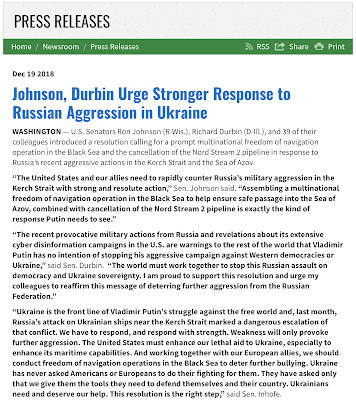
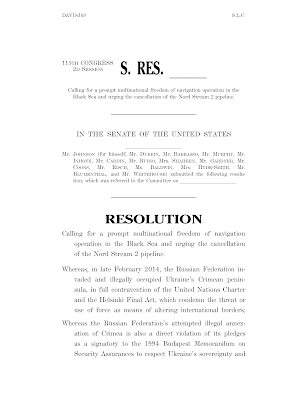
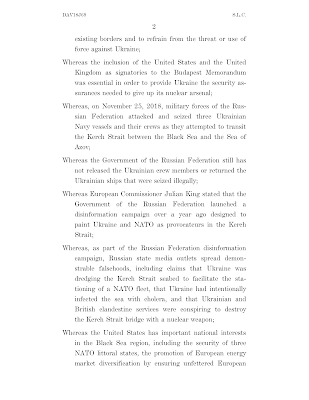
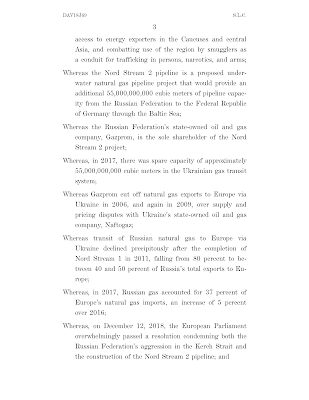
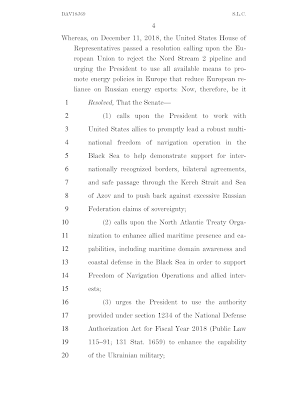
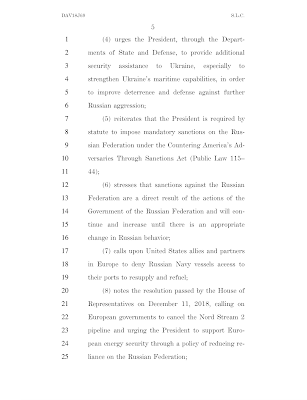
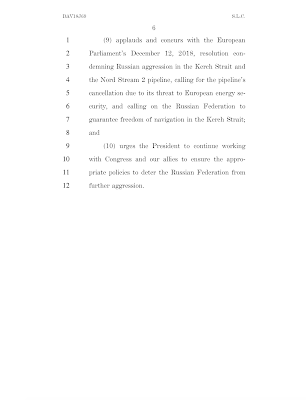
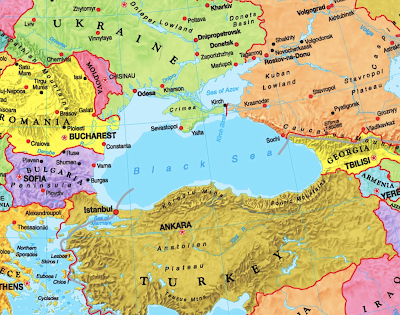
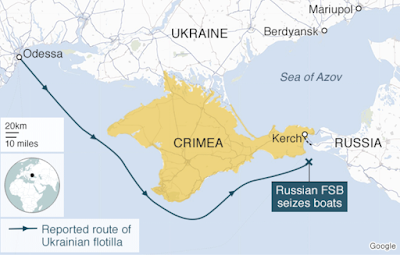
Be the first to comment